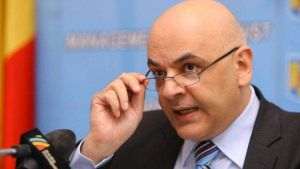• There are more "clever boys" leeching off the company than those involved in the direct bilateral contracts
• The unprofitable contracts are turning the idea of bringing professional managers to the state owned companies into an illusion
• Insolvency, an efficient tool to get rid of the leeches, Remus Borza says
Hidroelectrica can not exit insolvency this autumn, "like some are triumphantly announcing", the receiver of the company, Remus Borza said yesterday.
Prime Minister Victor Ponta and minister of the Economy Daniel Chiţoiu recently said that Hidroelectrica will exit insolvency this summer and will be a much stronger company.
Mr. Borza explained his position: "Exiting the insolvency in autumn isn't opportune. A realistic deadline would be next summer. Some people feel like insolvency has ended now that the contracts with the clever boys have been denounced. The contracts are just the tip of the iceberg. We have identified seven more causes which have led to the insolvency of Hidroelectrica".
Remus Borza went on to say: "The only one who manages Hidroelectrica is the receiver. That final. I understand these are political statements. I praise the courage of prime minister Ponta, minister Chiţoiu and of the head of the OPSPI, Remus Vulpescu, to begin the insolvency procedure. A more realistic deadline would be June 30, 2013. This deadline shouldn't frighten anybody", Borza said.
Hidroelectrica has 839 creditors, and the amount of the claims made against it by 327 of them amounts to 5.1 billion lei. The receiver said yesterday, in a conference: "When we are done reviewing all of the cases of the creditors, we may have the surprise to find out that we may have 6-7-8 billion lei in liabilities. How will we pay our creditors? Technically, we could end the insolvency in autumn if we schedule the payment of receivables or if we convince the creditors to drop their claims. Which is impossible".
Remus Borza claims that Hidroelectrica was deprived of important revenues (about 1.2 billion Euros between 2006 and the present day) not just as part of the bilateral contracts concluded with the so-called "clever boys". We found irregularities with the investment, maintenance and retooling contracts as well. According to Mr. Borza, the overpriced works have caused Hidroelectrica to incur significant losses over the last few years.
The receiver of the hydroelectric energy maker promised that in the coming days he would deliver a 500-page thick report on the manner in which the company has been "leeched" in the contracts which it is involved in and which have led to its current liquidity shortage: "I know I have created numerous controversies when I said that all state owned companies should go through the < insolvency purgatory >. These unprofitable contracts with the state owned companies are numerous, they are well designed, they are difficult to terminate. That is why I am not a fan of private management. It means money down the drain. No manager brought in from London or Washington can clean up in a state owned company, because they will find the same burdensome contracts, which they won't be able to terminate. If they intend to do that, the manager will find that it will need to pay hundreds of millions of Euros in penalties, because these contracts were made by smart lawyers of some clever boys and they have insured themselves against unilateral termination".
According to Remus Borza, the private manager will find themselves having to pay huge severance packages to every employee they wish to lay off: "These private managers will see the light and when they decide to do restructuring, they will have to pay tens of severance packages. For example, the average gross salary at Hidroelectrica is 1,643 Euros/month".
Concerning the older project, which was included in the letter agreed with the IMF, to privatize Hidroelectrica through the Stock Exchange, Remus Borza had the following to say: "I personally think that we have done enough privatization in Romania and we have depleted our country's resources enough. All we have left is to sell the mineral resources, and that, just as wars are now being waged over food and mineral resources. We have sold everything and that is why I am not a fan of the privatization of Hidroelectrica, which can function just fine while being part of the state's portfolio. The company is already partially privatized, because 20% of the share capital has been transferred to the Proprietatea Fund. But the privatization of the company is a political decision".
He said that everyone's goal is to make sure that the insolvency procedure will take place thoroughly, and the receiver has the duty to eliminate the other reasons for the insolvency: the sales of energy at prices lower than the output cost on the regulated market; the overpriced retooling or investment contracts; the 423% increase in the price of processed water; the overly large wage expenses compared to labor productivity; faulty management.
• Hydroelectric energy for Alro - a price pegged to the quote of aluminum and the OPCOM markets
Remus Borza yesterday announced that the "hunting season for clever boys" has concluded with the signing of a new agreement with Alro.
He said that the price which has been set on Friday night is a minimum of 180 lei/MWh and a maximum of 214 lei/MWh and that it will fluctuate depending on the quote of aluminum on the London Metal Exchange. By renegotiating the contract with Alro, which will be valid until 2018, Hidroelectrica will get a price 70% higher than the current one (114-116 lei/MWh) and revenues between 540 million lei and 600 million lei a year, starting in 2013.
The receiver of Hidroelectrica said that he has obtained an additional 64 million lei in revenues, for the energy supplied to Alro in the first seven months of 2012. Mr. Borza said that through renegotiation with Elsid, Electrocarbon, Electromagnetica and Alro, he has increased revenues by 94 million lei in the first seven months of 2012.
Remus Borza said: "The first three rounds of negotiations with Alro were a little more tense, each of them was trying to impose their point of view. Later, they became more flexible. Starting in March this year, Alro had been paying 114 lei/MWh, whereas our costs were 125 lei/MWh. I told them that a large chunk of the profit they posted last year and in the first semester of 2012 was owed to Hidroelectrica. We have agreed with them a minimum price which we would never go below of, that is 180 lei/MWh. The maximum threshold is 214 lei/ MWh. From that difference alone, Hidroelectrica will earn an additional 45-80 million Euros in 2013".
He said that he has opted for maintaining the contract with Alro because it is the largest consumer in the country, it is buying banded energy, which gives Hidroelectrica stability, predictability and is an advantage in the relationship with banks: " Alro constantly uses energy, 24/7, throughout the year. The contract with them gives Hidroelectrica stability and predictability, with constant revenues of approximately 150 million Euros per year. The lender banks have agreed to the pricing formula we agreed upon with Alro and we got their principle agreement".
As a novelty element, Borza says that he introduced as a reserve, the option to adjust the price of energy based on the evolution of the Romanian energy market -OPCOM.
He also provided details on why the contract with Alro was signed on Friday night instead of on Wednesday: "The Ministry of the Economy, the majority shareholder of Hidroelectrica, has agreed to maintaining the formula which pegs the price paid by Alro for energy to the quote of aluminum, but the Proprietatea Fund, the minority shareholder, opposed it, thinking that the formula of indexing the price based on the energy market was more profitable, as prices have skyrocketed lately. But the accelerated price increase to more than 300 lei/MWh on the spot market, approximately 400 lei/MWh on the balancing market and over 250 lei/MWh on the PCCB market, is circumstantial, due to the hydrological draught. It won't be long before those prices fall. These prices aren't sustainable for the industry and we have received signals in that regard from many companies. We selected as a reporting market the global aluminum market, rather than the immature energy market in Romania".
The receiver of Hidroelectrica succeeded in getting a formula for indexing the price of energy to the OPCOM markets in the contract with Alro, appeasing the shareholders of Hidroelectrica.
















































